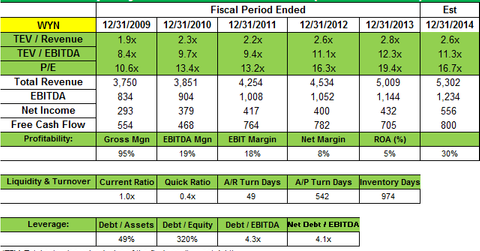Why Chilton starts new position in Wyndham Worldwide
Approximately 63% of Wyndham’s revenues come from fees for providing services referred to as its “fee-for-service” businesses.
Dec. 4 2020, Updated 10:52 a.m. ET

Chilton and Wyndham Worldwide
Chilton Investment added new positions in Canadian Pacific Railway (CP), CBS Corp. (CBS), and Wyndham Worldwide Corp. (WYN). It sold positions in CF Industries Holdings (CF), Norfolk Southern Corp. (NSC), and Tenet Healthcare (THC).
Chilton opened a new position in Wyndham Worldwide Corp. (WYN) which accounts for 0.69% of the firm’s 1Q14 portfolio.
Wyndham Worldwide provides hospitality services and products. It has 30 primary brands, which include Wyndham Hotels and Resorts, Ramada, Days Inn, Super 8, Howard Johnson, Wingate by Wyndham, Microtel Inns & Suites, Tryp by Wyndham, RCI.com, The Registry Collection, Wyndham Vacation Resorts, Shell Vacations Club, and WorldMark by Wyndham. Wyndham Worldwide was spun-off from travel and real estate services group Cendant Corp in 2006.
Its operations are grouped into three segments: lodging, vacation exchange and rentals, and vacation ownership. Wyndham Worldwide’s lodging business Wyndham Hotel Group has approximately 7,500 franchised hotels and 646,900 hotel rooms worldwide. Wyndham Exchange & Rentals is a professionally managed vacation rentals business, providing access to over 107,000 vacation properties in over 100 countries through its prominent exchange and vacation rental brands. Wyndham Vacation Ownership develops, markets, and sells vacation ownership interests and provides consumer financing to owners through its network of over 190 vacation ownership resorts serving approximately 907,000 owners throughout the United States, Canada, Mexico, the Caribbean, and the South Pacific.
How does Wyndham generate revenues?
Approximately 63% of Wyndham’s revenues come from fees for providing services referred to as its “fee-for-service” businesses. It receives fees in the form of royalties for use of its brand names, for providing property management services to hotels, rental properties, and vacation ownership resorts, for providing vacation exchange and rentals services, and for providing services under its timeshare sales model Wyndham Asset Affiliation Model (or WAAM) Fee-for-Service. The remainder of the revenue comes mainly from proceeds received from the sale of vacation ownership interests (or VOIs) and related financing.
During 2013, Wyndham derived 75% of its revenues in the U.S. and 25% internationally.
Revenue increase driven by lodging and vacation ownership business
First quarter revenues missed estimates, but increased 5% to $1.2 billion from the prior year period driven by growth in the company’s lodging and vacation ownership business segments. Adjusted net income was up 10% to $102 million, or $0.78 per diluted share, compared with $98 million, or $0.71 per diluted share for the same period in 2013. The increase reflects solid operating results across all of the businesses and lower interest expense, as well as a benefit from Wyndham Worldwide’s share repurchase program. It saw revenue increase across all of its three segments. The company said, “In our Hotel Group, domestic RevPAR growth accelerated. In Vacation Ownership, a combination of increased sales and a lower loan loss provision drove strong revenue growth. In our Exchange and Rentals business, peak season summer vacation rental bookings are up from last year.”
Management reaffirms 2014 outlook
The management said on the earnings call that the full year outlook for the business remains unchanged. It expects revenues of approximately $5.250–$5.350 billion for the full year. They added, “The general economic environment in Europe is improving, and we expect operating enhancements that we’ve put in place, namely, technology, enhanced yield management capabilities and streamlined cost structures to give us more than our fair share from the economic recovery.”
Wyndham has a robust share buyback program
Since 2007, Wyndham’s board has increased the capacity of its share repurchase program five times, bringing the total authorization under the program to $3 billion as of December 31, 2013. For 2013, the company spent $590 million to repurchase 9.7 million shares of its common stock. It repurchased 2.1 million shares for $150 million during the three months ending March 31, 2014. Its remaining share repurchase authorization totaled $476 million as of April 23, 2014. In February, the company declared a cash dividend of $0.35 per share—a 10% increase from the previous $0.29 per share dividend.
